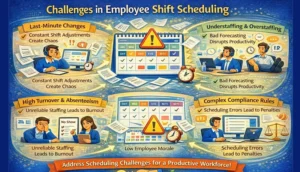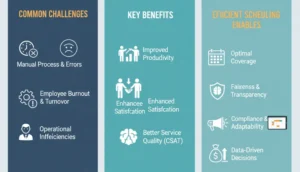Is Mandatory Overtime Legal? How Can Contact Centers Avoid It
Explore the legality of mandatory overtime in contact centers and discover strategies to avoid it for a balanced, efficient workforce.
5 min read
Is mandatory overtime legal?
Contact centers and business process outsourcing (BPO) companies often grapple with high call volumes, unpredictable schedules, and complex workforce management challenges. In response to these demands, some contact centers resort to mandatory overtime—a practice that raises ethical and legal questions.
Understanding the legality of mandatory overtime is crucial for CXOs, HR managers, and operations managers who strive to maintain productivity while fostering a supportive workplace environment. In this blog post, we will delve into mandatory overtime, explore its legal status, and provide actionable strategies for contact centers to avoid reliance on this practice.
Contact centers operate in a highly dynamic landscape where customer satisfaction hinges on the ability to swiftly and effectively handle inquiries. The concept of mandatory overtime comes into play when the workload exceeds the usual capacity of the workforce.
However, many business leaders question whether this approach is both legally compliant and beneficial to employee morale. This blog post aims to answer these questions, offering a comprehensive guide to understanding and managing mandatory overtime.

The Legal Framework of Mandatory Overtime
The legality of mandatory overtime is a topic that varies significantly from one country to another. In the United States, the Fair Labor Standards Act (FLSA) allows employers to require overtime work, but it mandates compensation at one and a half times the regular pay rate for any hours worked beyond 40 in a workweek. While this provides a legal basis, it’s essential for contact center managers to consider other implications such as employee burnout and potential legal challenges based on misclassification of workers.
Similarly, countries in the European Union follow the Working Time Directive, which limits weekly working hours to 48, unless employees voluntarily opt-out. It’s crucial for contact centers operating internationally to comply with local labor laws to avoid legal repercussions and maintain a positive reputation as an employer.
Pro Tip
Regularly consult with legal advisors to ensure your overtime policies are up-to-date with the latest employment laws in all regions where you operate.
Statistical Insight: According to Eurofound, 12% of employees in Europe working irregular hours reported feelings of work-related stress compared to 8% of those with regular hours.
The Impact of Mandatory Overtime on Employee Well-Being
Mandatory overtime can significantly impact employee morale and well-being. When employees are frequently required to work extra hours, it can lead to increased stress, fatigue, and work-life imbalance. This often results in higher absenteeism rates and reduced productivity.
Furthermore, a 2021 survey conducted by Gallup found that employees who work more than 45 hours per week are more prone to experience burnout-related symptoms compared to those working 35-40 hours. This highlights the importance of finding a balance between meeting business demands and preserving employee health.
Pro Tip
Conduct regular employee surveys to gauge stress levels and gather feedback on overtime policies. This can help tailor strategies that prioritize employee well-being.
Strategies to Avoid Relying Heavily on Mandatory Overtime
- Implementing Flexible Scheduling
- Leveraging Workforce Management Software
- Outsourcing and Automation
Implementing flexible scheduling can significantly reduce the need for mandatory overtime by allowing employees to choose hours that fit their personal schedules, thereby improving job satisfaction and reducing turnover.
Workforce management software offers a robust solution to optimize staffing. These tools can accurately forecast demand and schedule shifts accordingly, minimizing peaks that require overtime. Technologies such as HiveDesk can help in monitoring employee productivity efficiently, ensuring optimal workload distribution.
Outsourcing and automation can be game-changers in managing workloads without increasing staff hours. By adopting AI-driven customer service solutions or outsourcing specific tasks during peak times to trusted partners, contact centers can maintain service levels without overburdening their employees.
Pro Tip
Explore AI-driven customer service platforms that can manage repetitive inquiries, freeing up your staff for more complex customer issues.
The Role of Communication and Leadership in Reducing Overtime
Open communication channels and strong leadership play pivotal roles in reducing reliance on mandatory overtime. Managers should foster an environment where employees feel comfortable discussing workload issues and proposing solutions. Transparency about business objectives and the reasoning behind scheduling decisions can also facilitate employee buy-in and cooperation.
Research from the Harvard Business Review suggests that organizations with open communication and strong leadership not only experience lower employee turnover but also higher productivity levels. Managers should aim to be approachable, providing guidance and support to their teams.
Pro Tip
Engage in regular one-on-one meetings with staff to discuss workload concerns and collaboratively develop manageable solutions.
Training and Development for Enhanced Workforce Efficiency
Continuous training and development programs can enhance workforce efficiency, reducing the reliance on mandatory overtime. By equipping employees with skills and knowledge that improve their work speed and quality, contact centers can better handle fluctuating workloads without requiring excessive hours.
Implementation of robust on-the-job training and cross-training opportunities not only empowers employees but also improves overall organizational productivity. The American Society for Training and Development (ASTD) found that companies investing in employee training yield 24% higher profit margins than those that don’t.
Pro Tip
Establish a mentorship program to fast-track the learning process and improve skill acquisition among new employees.
Conclusion: Achieving Balance in Workforce Management
While mandatory overtime may appear as a quick fix for handling high demand periods, it often incurs costs that outweigh its benefits—including legal risks, decreased employee morale, and reduced productivity. Contact centers can achieve sustainable business operations by embracing flexible scheduling practices, advanced workforce management software, and investing in leadership development.
By proactively addressing the root causes of overtime and prioritizing employee well-being, organizations can enhance their reputation as employers of choice, ultimately leading to improved employee retention and customer satisfaction.
FAQ: “Is Mandatory Overtime Legal?”
What does mandatory overtime mean?
What does mandatory overtime mean? Mandatory overtime requires employees to work extra hours beyond their scheduled shifts.
Can employers force mandatory overtime?
Can employers force mandatory overtime? Yes, but employers must comply with labor laws that often require additional pay for overtime hours.
How does mandatory overtime affect employees?
How does mandatory overtime affect employees? It can lead to increased stress, decreased morale, and a higher risk of burnout.
Is mandatory overtime legal in the United States?
Is mandatory overtime legal in the United States? Yes, mandatory overtime is legal provided employees are compensated according to FLSA guidelines.
Do employees have the right to refuse mandatory overtime?
Do employees have the right to refuse mandatory overtime? In most cases, no, but refusal scenarios depend on union contracts and specific state laws.
How can businesses avoid relying on mandatory overtime?
How can businesses avoid relying on mandatory overtime? Through flexible scheduling, workforce management tools, outsourcing, and automation.
What are the alternatives to mandatory overtime in contact centers?
What are the alternatives to mandatory overtime in contact centers? Alternatives include flexible scheduling, employee cross-training, and workforce management software.
What are the penalties for refusing mandatory overtime?
What are the penalties for refusing mandatory overtime? Penalties depend on state laws and company policies, but may include termination.
How does mandatory overtime impact productivity?
How does mandatory overtime impact productivity? While it may meet immediate demand, it often reduces overall productivity due to employee burnout.
What’s the role of legal advice in managing overtime policies?
What’s the role of legal advice in managing overtime policies? Legal advice ensures that overtime policies comply with labor laws and help prevent legal disputes.
Start your outsourcing company’s transformation today!
Say hello to productivity, accuracy, and profitable growth. Streamline your operations and project management with HiveDesk.



